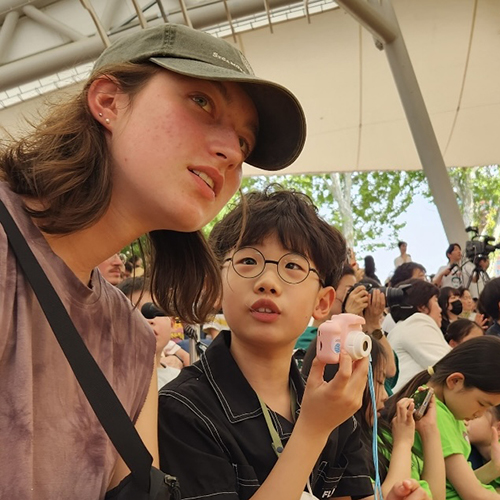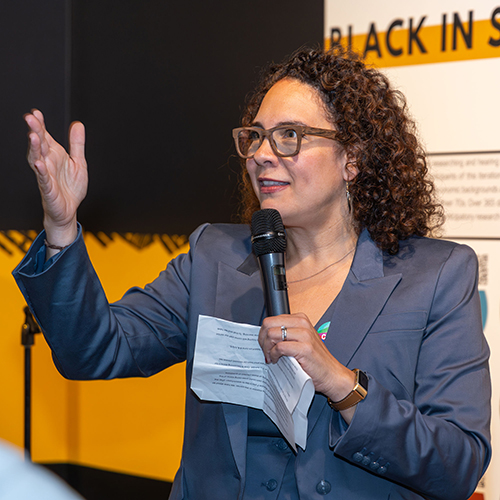It’s an important language for the study of late ancient Christianity and early Islam. It’s the language of some of the earliest Judeo-Christian writings. Its vocabulary can be found throughout the Quran. Yet the classical language Ge’ez is little known beyond the Horn of Africa and taught at just two universities in the Western world. Make that three — the University of Washington offered Ge’ez 101 for the first time this spring.
Hamza Zafer, assistant professor of Near Eastern Languages and Civilization, expected a handful of students to sign up when he offered this obscure classical language. Instead the class filled to capacity, with 30 students enrolled within days and more on the waiting list. Four graduate students with a scholarly interest in Ge’ez signed up, but the rest had more personal reasons for enrolling. “Most of the students are children of immigrants from the Horn of Africa — Somalia, Ethiopia, and Eritrea,” says Zafer. “Many of them grew up in Seattle exposed to Ge’ez in their communities, since Ge’ez is a living liturgical language in the Ethiopian and Eritrean orthodox churches, much like Latin was the liturgical language in Roman Catholic churches.”

Those students include bioengineering major Jerusalem Kifelew, who grew up hearing Ge’ez in the Ethiopian Orthodox Church, and business pre-major Fethawit Musye, who heard it in the Eritrean Orthodox Church. “When my friends and I heard Ge’ez was being offered as a class at UW, we were really excited because we actually had a chance to learn more about the language we grew up hearing,” says Musye.
Unlike his students, Zafer had no contact with Ge’ez early on. As a specialist in early Islamic history and thought, Zafer was formally trained in many late ancient literary languages — Syriac, Greek, Hebrew, and Arabic — but not Ge’ez, despite its significance and centrality. “It’s a very important language,” he says, “but as a classical African language it has been largely ignored by the Western academy, which privileges the classical languages of Europe and Western Asia.” Zafer taught himself Ge’ez while doing his doctorate, using old grammar texts from Germany. “I learn languages, dead and alive, like a treat for my brain,” he laughs. “I know over two dozen languages this way. Ge’ez started out as a linguistic treat, but now it informs my research on early Islam and has become a much deeper intellectual interest.”

Ge’ez dates back to at least the second century and belongs to the only part of Africa that was never colonized by a European power, a fact that Zafer points out in class. He also emphasizes the language’s formative impact on Christianity and Islam. “The field of early Islamic studies has always been oriented towards Europe and Western Asia, which are seen as the cradle of Jewish and Christian thought," says Zafer. "Africa is never seen as part of the equation. But east African Judaism and Christianity had just as much, if not more, of a formative impact on early Islam. The fact that a lot of Christological vocabulary in the Quran is in Ge’ez tells us that the Christianity that the earliest Muslims encountered was an African Christianity.”
It’s a very important language, but as a classical African language it has been largely ignored by the Western academy....
Learning about the historical role of Ge’ez has been an eye-opener for many students. Kifelew says that understanding the language’s historical importance has made her even more engaged with Ge’ez. She’s also intrigued by its longevity. “The language has remained unchanged and in its original form,” says Kifelew. “It’s so common to see languages change over time due to different influences, and it’s very interesting to see how and why Ge’ez has stayed constant.”
Beyond what they learn in class, the students also benefit from the rare opportunity to be surrounded by classmates with a similar background. “Every day they come into class giddy,” says Zafer. “This is probably the only time these American students will be in a classroom where most of their classmates share their African ancestry. They are one of many, rather than the exception. As a person of color myself, I realize how empowering such spaces and experiences can be, especially in the current climate.”

Musye and Kifelew have certainly found that to be true. “This is the first class I’ve taken at the UW where I feel completely understood by my peers,” says Kifelew. Adds Musye, “Being in this class with students who not only look like me but also come from a similar background has been enlightening, because we’re able to make connections to our culture.”
Zafer is pleased that his department chair recognizes Ge’ez’s significance — both to historians and many Washingtonians — and helped get the course on the books. He believes that the language has been overlooked in academia for far too long.
“There has been an implicit hierarchy of what corpuses of writing or languages or intellectual traditions are important in the humanities,” says Zafer. “Part of offering this class is to upend that, to point out that these hierarchies are embedded in a particularly Eurasia-centric understanding of high Classical learning. The class serves as a reminder that the West includes communities that have different hierarchies of knowledge and different visions of history.”
More Stories

Democracy by the Numbers
Mathematics and Democracy, an undergraduate mathematics course, explores the role of math in many aspects of democracy, from elections to proportional representation.

Finding Family in Korea Through Language & Plants
Through her love of languages and plants — and some serendipity — UW junior Katie Ruesink connected with a Korean family while studying in Seoul.

Interrupting Privilege Starts with Listening
Personal stories are integral to Interrupting Privilege, a UW program that leans into difficult intergenerational discussions about race and privilege.